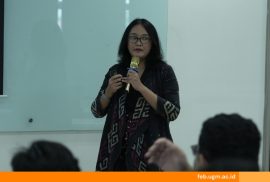The 1st Gadjah Mada International Conference on Islamic Economics and Development (GAMA ICIED) call for paper on the theme “Recasting the Significance of Islamic Economics for Socioeconomics Development”.
Topics of interest include, but are not limited to:
- Islamic Economics as a Scientific Discipline
- Critical evaluations of the contribution of Islamic economics to development
- Problems with the current scope and methodology of Islamic economics
- Redefinition of Islamic economics’ scope and methodology and its consequences
- Further challenges in the development of Islamic economics as a discipline
- Microeconomic and macroeconomic models in Islamic economics
- The teaching of Islamic economics: Potentials and experiences
- Islamic Financial System and Global Economic Stability
- Islamic economic views of the global financial and the sovereign debt crises
- The significance of Islamic financial system for global economic stability
- Measuring the performance and stability of Islamic financial system
- Resilience and inclusiveness of Islamic financial services industry
- Islamic vs. conventional monetary and macroprudential policies
- Risk management under a mixed system of Islamic and conventional finance
- Growth, Inequality and Institutions
- Growth and inequality from an Islamic perspective
- Islamic socioeconomic institutions and the growth and inequality dynamics
- The role of fiscal policy to increase growth and reduce inequality
- Social capitals and their impact on economic productivity
- Governance, property right, competition, entrepreneurship and innovation
- Resource gap, external public/private debts and development
- Sectoral policies and the performance of primary, secondary and tertiary sectors
- The problem of corruption and its direct and indirect consequences
- Prospects and challenges of small and medium enterprises (SMEs)
- Trade Agreements and Development
- International trade and free trade agreements from an Islamic perspective
- Free trade agreements, openness and economic welfare in developing economies
- Prospects and challenges of cooperation among the OIC member countries
- Pursuing Development amidst Regional Instability
- Peace and conflict resolution from an Islamic perspective
- Causes and consequences of social and political conflicts
- The political economy of refugee migration
- Handling refugees: Experiences from different countries
- Post-conflict stabilization and reconstruction
- Labor and Social Justice
- The nature and significance of labor and employment in Islam
- Behavior in the labor market and its determinants
- The effect of individual characteristics on labor market outcomes
- Labor market and labor organizations
- Government regulations and social justice in the labor market
- Education, Health and Human Development
- Human development in Islam: Basic concepts and measurements
- The significance of education and health for development
- Challenges in the provision of education and health services
- Impact evaluations of education, health and human development programs
- Madrasah vs. school: Choice, outcome and return to education
- The roles of government: From regulation to financing
- Family and the Society
- The roles of family as the building block of the society
- Economic hardship and the life of families
- Family background and the opportunities for children
- Family decision making and economic behaviors in different markets
- The importance of family inheritance institutions for the economy
- Disputes about family inheritance: Causes and consequences
- The impacts of government policies and regulations
- Tobacco and Poverty Alleviation
- Tobacco consumption from an Islamic perspective
- Consumption of tobacco among the poor
- Private and social costs of tobacco consumption among the poor
- Evaluations of policies and regulations with respect to tobacco consumption
- Resource Use and the Environment
- Islamic perspectives on the environment: Basic concepts and measurements
- Causes and consequences of unsustainable environment exploitation
- Evaluations of policies and regulations related to environment exploitation
- Climate change and socioeconomic development
- The political economy of natural disaster
- Islamic Redistributive Schemes
- The significant of zakah, waqaf and other voluntary for poverty alleviation
- Challenges faced in zakah and waqaf collection and distribution
- Empirics on the determinants of behavior with regard to zakah and waqaf
- The causes and consequences of zakah and waqaf disputes
- The impacts of policies and regulations related to zakah and waqaf
Important dates:
- Deadline abstract submission: February 6, 2016
- Notification of Abstract Acceptance: February 13, 2016
- Deadline for Paper Submission: March 19, 2016
- Notification of Paper Acceptance: March 26, 2016
- Conference: May 12, 2016
Submission Guideline:
- Prospective participants, either an individual or individuals, may submit one or more separate abstracts and papers, provided they understand that 1st Gama ICIED participation policies prohibit more than one-sole authored presentation and no more than three coauthored presentations on the final program.
- To be accepted, all abstracts and papers must be written either in English, Arabic or Bahasa Indonesia. The abstracts should be 100-150 words, with minimum use of acronyms, abbreviations or references in it. Papers that are of original works should be 15-25 pages (including tables and references), typed single spaced in MsWord format using Times New Roman (normal style and font size 12).
- Submissions of abstracts and papers are all via online submission system, through http://gamaicied.feb.ugm.ac.id. To submit or edit an abstract or paper, please login first. For those who are new, a username/password can be obtained by creating an account (please do not forget to tick the role as author).
This event is made by the collaboration of: Faculty of Economics and Business UGM (FEB UGM), School of Graduate Student UGM (SP UGM), Society for the Advance of Islamic Economic Studies (SAIES), and Indonesian Association of Islamic Economists (IAEI). For further information can contact: Akhmad Akbar Susamto, email akhmad.susamto@ugm.ac.id or visit http://gamaicied.feb.ugm.ac.id




